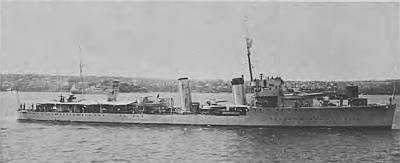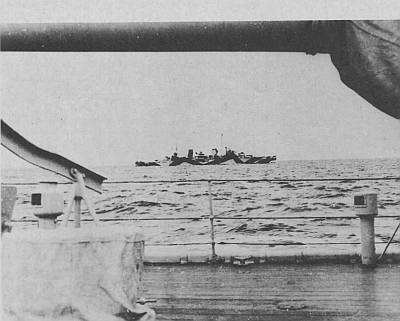- Author
- Owen, Commander P.O.L.
- Subjects
- Biographies and personal histories
- Tags
-
- RAN Ships
- None noted.
- Publication
- August 1972 edition of the Naval Historical Review (all rights reserved)
The rapport he established was so profound as to forestall any inhibitions in decision making as long as reason prevailed. To him one’s poorer decisions were at least decisions – and not stagnancy.
The Commander in Chief’s wife – Lady Cunningham – held Waller in high esteem and there were good practical reasons for this. He delighted in ferretting out and scrounging sewing machines on the Tobruk Run for her Fleet Wives ‘working bees’.
Women enjoyed his company more, I think, because of the paradox in him. Although there was no doubt that he was all man to look at, he was interested in some things that concerned them.

In Malta, for instance, after a luncheon at St. Anton Palace, where my wife and I accompanied him, Lady Bonham-Carter took us for a stroll in the gardens. These were beautifully laid out and were walled and flagged. A considerable portion was given over to a large variety of roses, with some of which Her Excellency’s gardener was having trouble. This was Hec’s moment. He quickly diagnosed the cause like an expert until Lady Bonham-Carter interrupted him, so that she could send for the gardener to hear the cures direct.
It seems very likely Waller had learned his rose expertise from a character at Flinders Naval Depot in 1926. Lieutenant- Commander Prideaux, attached to the Gunnery School, boasted a delightful rose garden which fronted the Wardroom. In his gunnery gaiters and between the odd ‘drop o’ the suds’ he would tend the roses with knowledgeable and loving care.
No one could describe Hec as a poodle faker or a snake but he was always ready for a party – and it would never be a dull one whether mixed or not. He had a flair, also, to concentrate on the job in hand and simultaneously to avoid shutting all other considerations and expectations out of his mind.
I had much to discuss with him on his infrequent returns to harbour at Alexandria and always a mountain of reports amid administrative papers. He would pull on his pipe, let forth a heavy cloud of smoke and keep me fixed in his sights as we spoke, his eyes never drawing away.
On most occasions he was short of available time, anyway; a conference with his Captains or a Senior Officer in the offing.
There seemed to be fewer motor boats in Alexandria those days than warships. I always used a 40-foot felucca whose owner sported a tarboosh and spotless white galabier. He seemed to know fleet movements very well and was never missing when I needed his services. It was five piastres the round trip including waiting time at Stuart and sometimes the waiting time was extended if the hour was right! From my first hiring of the felucca Abdul gave me the tiller. In a stiff breeze she would go like merry hell but I always avoided collisions. I never knew of course what he thought of me as a helmsman but I had the money!
Once I arrived alongside Stuart before she had finished securing at the buoy. To my astonishment, I found Waller alongside the other side in his 12-foot sailing dinghy ready to sail. ‘If you want me to sign those bloody papers we’ll do it here. I’m not going back on board!’ He was going sailing and was not to be deprived of his long awaited relaxation.
The mutual understanding between Waller and his Captains was excellent. The destroyer Captains themselves were all outstanding men. He knew all the officers in the flotilla and often surprised them by the depth of his knowledge of them and their interests. Loyalty, for him, was a two-way switch. In his reports he was not a waster of words. Praise or admonishments were very much to the point and never embellished.
He liked to relax and seized every opportunity of doing so, whether it was a good dinner ashore (he loved his food and was a mighty sweets eater, from steamed pudding to Crepes Suzette). He was quite a trencherman. A cabaret he enjoyed also.
He frequently came to a meal or drinks at our apartment in Alexandria – generally after a brisk walk. There he found relaxation. I found proof of how much he appreciated these occasions when I returned to Australia in late September 1945, from Japan. I found a letter from Nancy, Hec’s widow, to my wife written in April 1942, in which she recalled Hec’s happy recollections of these visits and his speculations after he returned home from the Mediterranean as to whether he and I would fetch up with each other again.
He construed orders and written instructions with great ease and generally at the first reading. Moreover he could assess the flow-on they signified and accordingly carry out their purport skilfully and advantageously. Others may have seen luck in the manner of his execution. But in fact it was intelligent application to his job.
Words can be heaped upon this fighting seaman – audacity, fearlessness, determination, precision, perseverance and patience. For him armament was mounted to be used. Even as early as October 1939 he was firing shots across the bows of unidentifiable ships as we approached Singapore. Two years later warships were being sunk or put out of action for not doing just this. The Admiralty in early 1942 made a general signal concerning this failure.

Waller, like many others, was a little weary when he returned home in the middle of 1941 and just before he left the Mediterranean he confided in me that on more than one occasion he had awakened and rushed up on deck only to find all was quiet and peaceful. Many Captains suffer this, not only in war, but in times of stress in peace. The mind is still in gear and sleep provides little rest.




